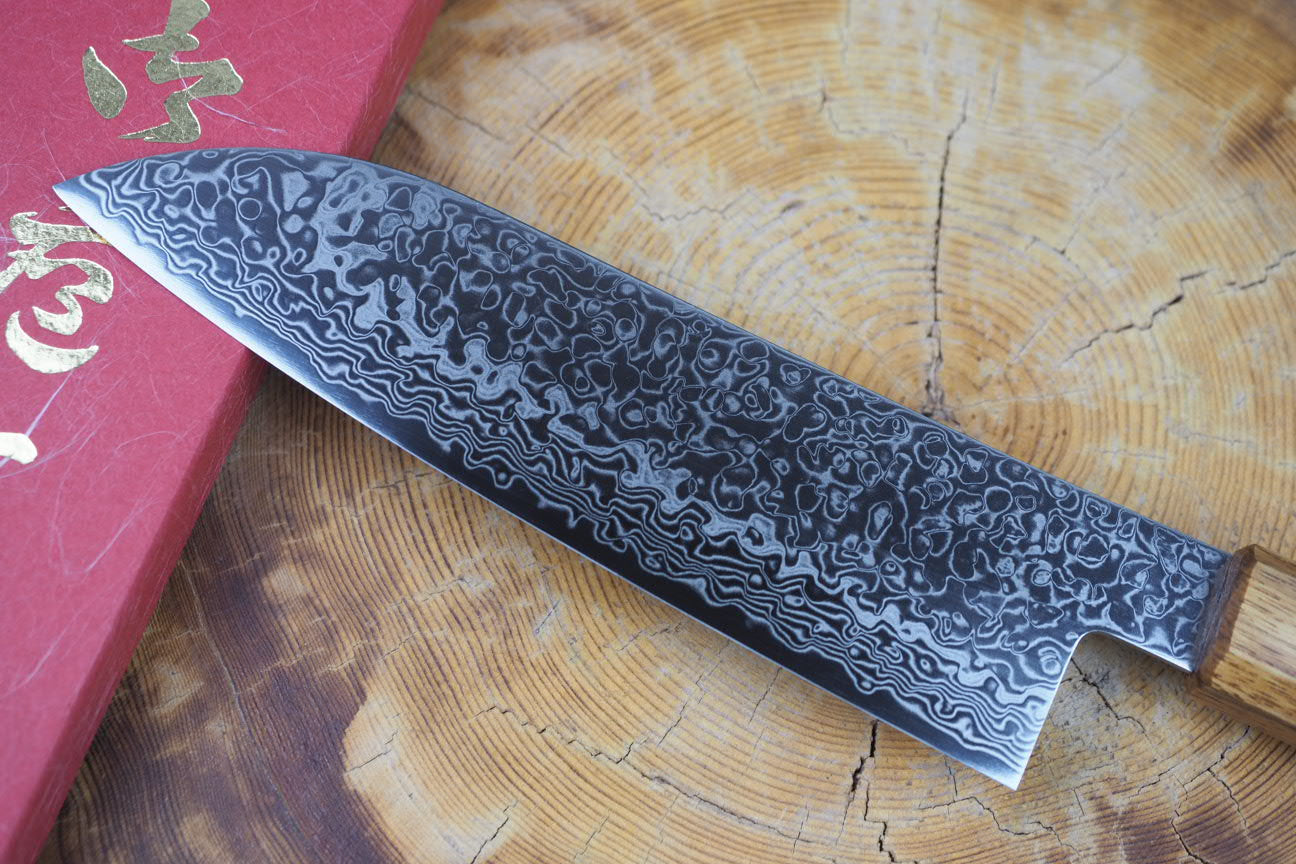Many people may have seen knives with Damascus patterns, but some may wonder: What exactly is Damascus? Is it the name of the knife? The type of steel? The pattern? Today, let's delve a bit deeper into what Damascus actually is. We'll also introduce the Damascus pattern knives available at Kaz's.
- What is Damascus steel? -
Damascus steel refers to the ancient Indian steel known as "Wootz steel," with Damascus being a nod to the capital city of Syria, where swords were prolifically produced, hence the name "Damascus steel."
- History of Damascus steel -
Are you familiar with the "Iron Pillar of Delhi," located in the outskirts of Delhi, India? Standing at approximately 7 meters tall, this iron pillar, made of Damascus steel, has been exposed to the elements outdoors for over 1600 years since its construction, yet it has hardly rusted. This remarkable durability suggests the advanced ironworking technology of ancient India.
During that time, swords made of Damascus steel were known for their sharpness, flexibility, and strength, making them highly coveted even among the royalty and nobility of the West.
However, the precise manufacturing method of the "Damascus (Wootz) steel" made in ancient India has not been passed down to modern times. Therefore, the Damascus knives available today are crafted by layering various types of steel to replicate the appearance and patterns of ancient "Wootz steel".
- The Hamon (波紋) pattern of Damascus steel -
The swirling patterns of Damascus steel are widely recognized as synonymous with sharp-edged weapons, imbued with a sense of mystery.
Now, how are these patterns formed? The original Damascus steel patterns emerged during the slow solidification process in a crucible, where steel with different melting points crystallized separately due to internal crystallization processes. However, this manufacturing method has not been passed down to modern times, and contemporary Damascus patterns are created by layering different metals, forging them together.
Layering and forging multiple materials, as known in the craftsmanship of Japanese swords, results in exceptionally strong blades. This is because the process of layering and forging materials compresses and refines the structure of the material, leading to increased hardness compared to single-layer materials and eliminating irregularities in the blade.
Indeed, true Damascus steel technology has been lost to history, and the term is often used merely because of its resemblance in appearance.
In addition to Damascus, other terms such as "Suminagashi" ( 墨流し ) and "Uzushio"( 渦潮 ) in Sakai, and "Stacking" ( 積層 ) in Seki, as well as more recent terms like "Millefeuille," are used to describe similar patterns.
Blades and patterns have always been closely linked, with traditional Japanese swords featuring "hamon" ( 刃文 )patterns, and Japanese kitchen knives showcasing "kasumi" ( 霞研ぎ ) patterns and "hamon-Ukashi” ( 波紋浮かし ) during the tempering process.

While knives with Damascus patterns may have drawbacks such as the difficulty in maintaining the pattern and slightly higher prices, their visual appeal is unparalleled, making each one a unique piece with no identical pattern. A knife is an essential tool in daily life, so why not explore finding your own favorite pattern?
- The Damascus pattern knives available at Kaz's Knife and kitchenware -
・Sakai Jikko “Loco Damascus” Wa-Gyuto knife VG10 Mirror - Plished Nickel Damascus with Japanese Oak Handle (21cm)
Introducing the new series featuring the popular “LOCO” VG10 steel with Japanese oak Handle series with Damascus patterns. In addition to the chef's knife, we also offer a sujihiki (carving / slicer) knife, a santoku knife, and a petty knife.

・Sakai Jikko “Loco Damascus” Wa-Gyuto knife SG2 Powdered High Speed Steel Mirror - Plished Nickel Damascus with Japanese Oak Handle (21cm)
This is a high-end knife from the 'LOCO' Damascus series, using High Speed powdered (SG2) steel.

・残心 Zan Shin (from Echizen) - Hand forged SG2 Powdered High Speed Nickel Damascus Kiritsuke (K-tip) Gyuto (Chef’s Knife) 21cm
This is a knife forged by the legendary swordsmith Mr,Nanbu, from Echizen.

・残心 Zan Shin (from Echizen) Hand Forged VG10 Nickel Damascus Kiritsuke (K-tip) Gyuto (Chef’s Knife) 24cm
This is a knife forged by the legendary swordsmith Mr,Nanbu, from Echizen.

・Seki Kanetsugu - Zuiun Gyuto SG2 High Speed Powdered Steel Kiritsuke (K-tip) Gyuto 21cm (custom sheath included)
The Zuiun is a 100th-anniversary model created as the culmination of Seki Kanetsugu's blade-making expertise. It comes in a Kiri gift box, perfect for gifting, and includes a custom sheath.

The captivating Damascus pattern is truly mesmerizing. Why not add a delightful knife to your home that will make cooking even more enjoyable every day?
We hope you enjoyed this story about Damascus steel today.
If you have any further questions or queries, please feel free to reach out.
Thank you for reading to the end.
See you on the next story.


